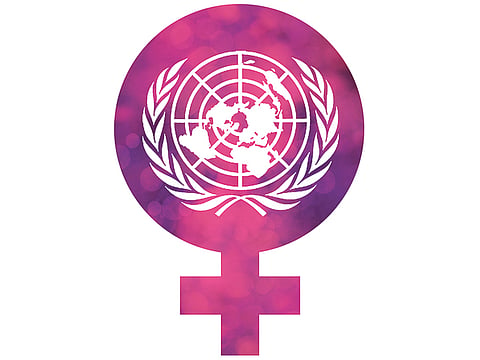It is time for a woman to lead the UN
There is a plethora of reasons that experts cite for the invisibility of women’s cerebral power

Recently when I read that Kenya was lobbying for its extremely capable and first woman foreign minister Ameenah Mohammad to fill the UN Secretary General post after Ban Ki-moon exits at the end of 2016, I immediately thought of Angela Merkel and her distinguished leadership of the recent Syrian refugee crisis. I thought how apt it would be to see a woman leading the UN for the first time on its 70th anniversary and a woman succeeding Barack Obama as US President. It would be a different world indeed.
But the contrast of reality is quite stunning. When you visit any bookstore or magazine rack when shopping, you will not miss the ubiquitous presence of women on every cover. Models, music divas, tennis players, cinema stars, all kinds of female dolls. This is how the advertisement industry wants consumers and eventually all society to view women. In a world hypnotised by this stereotyped sexual objectification, one can be forgiven for missing the real, hard working and intelligent women lost in this male gaze milieu.
Now, ask anyone if they can name any woman of note that holds a position of political, academic or business influence and probably the only two names that will come to mind will be Angela Merkel and Hillary Clinton.
There is a plethora of reasons that experts cite for this invisibility of women’s cerebral power, but one significant factor in my view is women’s glaring absence from the leadership of international organisations. Of all the international and continental organisations that exist today it is only the African Union (AU) that is led by a woman. This is a big leap for Africa as its international and regional counterparts such as the Arab League, the European Union, Nato, the Shanghai Cooperation Organisation, and above all the UN, are all led by men. Only four out of the UN’s 17 specialised agencies are led by women. They include the International Monetary Fund, UNESCO, World Health Organisation, and UN Women. Financial institutions such as the World Bank, African Development Bank, Asian Development Bank, Inter-American Development Bank, and Arab Monetary Fund all have men in the driving seat.
On international and regional courts, only the Inter-American Commission on Human Rights has a woman president while its counterparts, such as the African Court of Human and Peoples’ Rights, European Court of Human Rights, Inter-American Commission on Human Rights, and the International Court of Justice, have men perched on the top.
On the domestic level, according to a UN Women report, women account for only 22 per cent of national parliaments as of August 2015, while only 11 women served as Head of State and 13 worked as Head of Government out of 193 UN Member States, and here again an African country, Rwanda, prides itself for having the highest number of women parliamentarians worldwide. Women in Rwanda occupy 63.8 per cent of seats in the lower house. The report cites 37 countries in which women account for less than 10 per cent in one of the houses and six chambers with no women at all, while as of January 2015 only 17 per cent of government ministers were women.
In global business, the UK’s Equalities and Human Rights Commission estimated that women fill only 24 per cent of senior management roles, while only 26 female CEOs made this year’s Fortune 500 companies, and a meagre 54 in the top 1,000.
This is a pathetic record for the world which always sings about women’s empowerment but fails to translate the pompous slogans and agreements on gender equality into reality, particularly as women make up half of the world’s population, and studies have proven that, worldwide, girls outperform boys in education.
To elect a woman, therefore, for the top UN Seat at the end of 2016 when Ban Ki-moon’s second term expires may be a good way to catapult women to world leadership and to cast a positive light on them.
Since its creation in 1945, eight men have served as Secretary General, who came from Europe, Africa, Asia and Latin America. But no continent has until now put a woman’s name forward as a candidate, and there is now a campaign to appoint a woman for the top seat of the UN. A number of articles have been written and there is even a movement called “Campaign to Elect A woman UN Secretary- General” with a dedicated website and a list of outstanding women from around the world who could fill the post.
However, as the fervour for the idea gains momentum, I wonder if it has dawned on anyone what the founders of the organisation or the legal experts who wrote the UN’s Charter had in mind when they drafted article 97 of the charter, which says: “The secretariat shall comprise a sSecretary-general and such staff as the organisation may require. The secretary-general shall be appointed by the general assembly upon the recommendation of the security council. He shall be the chief administrative officer of the organisation.” Note the word ‘he’.
But that charter misstep aside, the world is in need of having a woman who, in my view, is better positioned to understand women’s issues such as violence against women, female genital mutilation, family choices, trafficking, family health and education, gender equality, as well as issues that are core to achieving global peace and prosperity. And what a powerful message it would be to the whole world to elect an African Muslim woman, allowing Kenya, which has given us the first black American President, to once again give us the first black woman UN Secretary-General.
Bashir Goth is an African commentator on political, social, and cultural affairs.
Sign up for the Daily Briefing
Get the latest news and updates straight to your inbox



